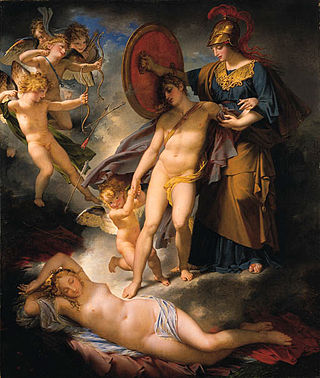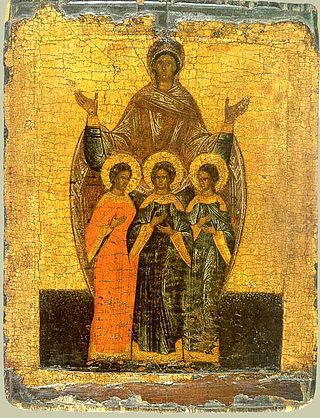
Wisdom, sapience, or sagacity is the ability to contemplate and act productively using knowledge, experience, understanding, common sense, and insight. Wisdom is associated with attributes such as unbiased judgment, compassion, experiential self-knowledge, self-transcendence, and non-attachment, and virtues such as ethics and benevolence.
Sophia means "wisdom" in Greek. It may refer to:
Wise, as a word, refers to someone with wisdom.

Saints Faith, Hope and Charity, are a group of Christian martyred saints, venerated together with their mother, Sofiia ("Wisdom").

Sophia University, is a private research university in Tokyo, Japan. Founded in 1913, Sophia is one of the three Sōkeijōchi (早慶上智) universities, a prestigious grouping which consists of the top three private universities in Japan alongside Keio University and Waseda University. Founded by the Jesuits, the university is affiliated with the Catholic Church. As of 2023, the University has 12,080 undergraduate students and 1,357 postgraduate students. The university has 9 undergraduate faculties and 10 graduate schools, with over 13,900 students in total. Sophia University has consistently ranked as the top Catholic university in Asia.

The O Antiphons are Magnificat antiphons used at Vespers on the last seven days of Advent in Western Christian traditions. They likely date to sixth-century Italy, when Boethius refers to the text in The Consolation of Philosophy. They subsequently became one of the key musical features of the days leading up to Christmas.
Hagia Sophia is a UNESCO World Heritage Site in Istanbul, Turkey. It was built in 537 as the Greek Orthodox patriarchal cathedral, later becoming a Roman Catholic cathedral, then a Sunni mosque, then a museum. It currently functions as a mosque.

Sophia is a central idea in Hellenistic philosophy and religion, Platonism, Gnosticism and Christian theology. Originally carrying a meaning of "cleverness, skill", the later meaning of the term, close to the meaning of phronesis, was significantly shaped by the term philosophía as used by Plato.

Chokhmah is the Biblical Hebrew word rendered as "wisdom" in English Bible versions.

The Congregation for Catholic Education (Institutes of Study) (Latin: Congregatio de Institutione Catholica (Studiorum Institutis)) was the pontifical congregation of the Roman Curia responsible for: universities, faculties, institutes and higher schools of study, either ecclesial or non-ecclesiastical dependent on ecclesial persons; and schools and educational institutes depending on ecclesiastical authorities.
Sapient means to be able to reflect on memories, and or possessing wisdom and may refer to:

Holy Wisdom is a concept in Christian theology.
Hikma, or other romanisations such as Hikmah and Hekme, may refer to:

Heinrich Dumoulin, S.J. was a Jesuit theologian, a widely published author on Zen, and a professor of philosophy and history at Sophia University in Tokyo, where he was Professor Emeritus. He was the founder of its Institute for Oriental Religions, as well as the first Director of the Nanzan Institute for Religion and Culture.
Father Peter Milward, SJ was a Jesuit priest and literary scholar. He was emeritus professor of English Literature at Sophia University in Tokyo and a leading figure in scholarship on English Renaissance literature. He was chair of the Renaissance Institute at Sophia University from its inception in 1974 until it was closed down in 2014 and director of the Renaissance Centre from its start in 1984 until it was closed down in 2002. He primarily published on the works of William Shakespeare and Gerard Manley Hopkins.
Wisdom is a form of knowledge.
Saint Sophia Church may refer to:
Sofia Church, named for Swedish queen Sophia of Nassau, is in Stockholm, Sweden.
This page is based on this
Wikipedia article Text is available under the
CC BY-SA 4.0 license; additional terms may apply.
Images, videos and audio are available under their respective licenses.








